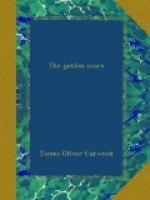Philip choked back the cry on his lips, and in that moment Bram stopped short, standing full in the starlight, his great lungs taking in and expelling air with a gasping sound as he listened for his wolves. He was a giant of a man. A monster, Philip thought. It is probable that the elusive glow of the night added to his size as he stood there. About his shoulders fell a mass of unkempt hair that looked like seaweed. His beard was short and thick, and for a flash Philip saw the starlight in his eyes—eyes that were shining like the eyes of a cat. In that same moment he saw the face. It was a terrible, questing face—the face of a creature that was hunting, and yet hunted; of a creature half animal and half man. So long as he lived he knew that he would never forget it; the wild savagery of it, the questing fire that was in the eyes, the loneliness of it there in the night, set apart from all mankind; and with the face he would never forget that other thing that came to him audibly—the throbbing, gasping heartbeat of the man’s body.
In this moment Philip knew that the time to act was at hand. His fingers gripped tighter about the butt of his revolver as he stepped forward out of the shadow.
Bram would have seen him then, but in that same instant he had flung back his head and from his throat there went forth a cry such as Philip had never heard from man or beast before. It began deep in Bram’s cavernous chest, like the rolling of a great drum, and ended in a wailing shriek that must have carried for miles over the open plain—the call of the master to his pack, of the man-beast to his brothers. It may be that even before the cry was finished some super-instinct had warned Bram Johnson of a danger which he had not seen. The cry was cut short. It ended in a hissing gasp, as steam is cut off by a valve. Before Philip’s startled senses had adjusted themselves to action Bram was off, and as his huge strides carried him swiftly through the starlight the cry that had been on his lips was replaced by the strange, mad laugh that Pierre Breault had described with a shiver of fear.
Without moving, Philip called after him:
“Bram—Bram Johnson—stop! In the name of the King—”
It was the old formula, the words that carried with them the majesty and power of Law throughout the northland. Bram heard them. But he did not stop. He sped on more swiftly, and again Philip called his name.
“Bram—Bram Johnson—”
The laugh came back again. It was weird and chuckling, as though Bram was laughing at him.
In the starlight Philip flung up his revolver. He did not aim to hit. Twice he fired over Bram’s head and shoulders, so close that the fugitive must have heard the whine of the bullets.
“Bram—Bram Johnson!” he shouted a third time.
His pistol arm relaxed and dropped to his side, and he stood staring after the great figure that was now no more than a shadow in the gloom. And then it was swallowed up entirely. Once more he was alone under the stars, encompassed by a world of nothingness. He felt, all at once, that he had been a very great fool. He had played his part like a child; even his voice had trembled as he called out Bram’s name. And Bram—even Bram—had laughed at him.




